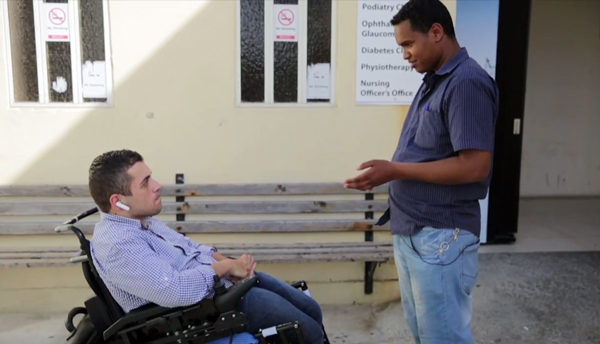Meet Muusu, whose story is a reminder of the perilous dangers many refugees face in their home countries.
It is estimated that there are 1 billion people worldwide who smoke at least one cigarette a day. In a year over 6 trillion cigarettes are consumed. There are many who try to quit the unhealthy habit. However, in some parts of Somalia, where Al Shabaab rules, smoking can be a particularly dangerous affair.
One night a few years back, two hooded men kidnapped Muusu, then a 19-year old man, and brought him to a nearby hut where they intended to chop off his hand. He was guilty of selling cigarettes.
Up till then, Muusu’s life was a fairly normal one.
Muusu was born in a family of five in a tiny village (“smaller than Hal Safi” – the place where he now lives) close to the Ethiopian border. His father died of natural causes when Muusu was still very young. Being the eldest sibling, he took the responsibility of his family on his shoulders and he opened a small shop, selling cigarettes. He was himself a heavy smoker at the time.
“Cigarettes and coffee are part of the Somali culture,” Muusu said while sitting on a bench in Floriana, far away from his old hometown. In fact he used to sell quite a few cigarettes – it was the family’s main source of income.
Life in his hometown had changed very quickly once Al Shabaab took over. A number of social activities were banned. “If you sell cigarettes and alcohol, you are not Muslim they said,” Muusu recounts, “They have their own rules. They do not believe in our religion and way of life.”
“I didn’t obey,” Muusu said, even though he closed his shop for fear of retaliation but instead kept selling them on the streets. “It was my only way to help my mother and brother.”
But one day he was caught.
“We know you are still selling them.”
“I don’t sell cigarettes.”
“We know you are selling cigarettes. You are young. If you want to help your family, join us. We’ll give you a gun. We’ll give you everything.”
“I refused,” Muusu said.
At night they came for him. He was walking on his way home, when he felt hands pushing him down to the ground. They were two hooded men from Al Shabaab. He could only see their eyes staring at him as they dragged him to a hut. He was waiting to get his punishment – his hand was to be chopped.
“I was very afraid. I did not know them. I was going to get punished,” Muusu said.
Somehow he found the strength to escape his confinement. However, as he attempted to run he was noticed by the guards. They shot him in the arm. He was left unconscious on the ground until he was found by his uncle who drove him to a hospital in Ethiopia.
His arm was in a very bad condition and the doctor had no choice but to amputate. The next 40 days at the hospital he was staring at what was left of his limb. “I stopped smoking. It reminds me of my missing arm when I smoke,” he said.
He returned to his village only to be warned by his mother.
“Why did you come back? Al Shabaab is looking for you. You cannot come back,” his mother told him.
“I was crying all the time so I left again for Ethiopia.” From there on he made the long journey across deserts and the sea to reach Malta in 2013.
Muusu now works as a cultural mediator at the Floriana Health Clinic. He is happy that at last he has managed to obtain some stability in his life. Apart from holding a stable job, he lives with Somali friends in an apartment in Safi.
“I call my mother a few times a month,” he said, “She asks me how I manage with just one hand. It is not easy but I manage. I have friends that help me, sometimes to cut food. But it’s OK.”
“But I do not tell my mum everything, I do not want to worry her,” Muusu said as he ends the interview to catch the bus home after a long week of work.

Muusu taking part in the ‘National Commission for persons with a disability’ (KNPD) TV spot campaign #HereWeAre to raise awareness on people with a disability in Malta.
Photo of Muusu by Darren Zammit Lupi
Share on Facebook Share on Twitter